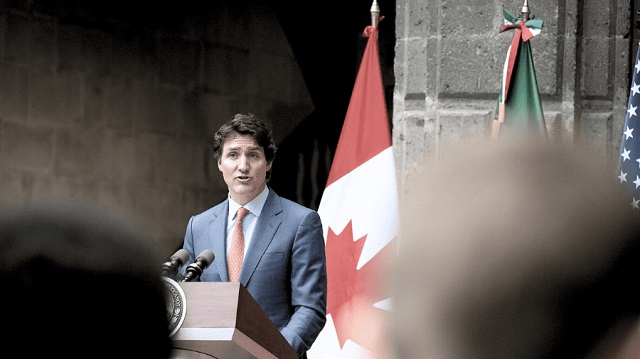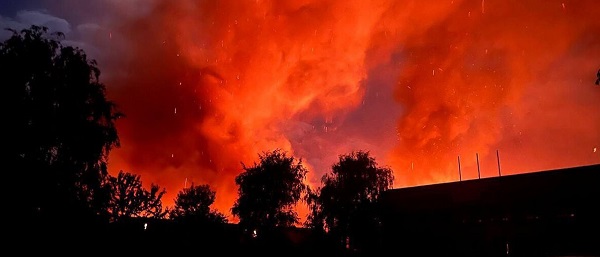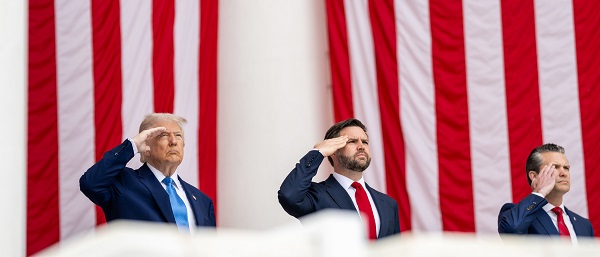conflict
Trudeau should know that Hamas is to blame

From the MacDonald Laurier Institute
By Johanna Blom
Israelis know the ‘world is watching’ and they too want Palestinian children to live in peace
On Thursday, November 9, an aging Right Honourable Brian Mulroney stood before the World Jewish Congress in New York to accept the organization’s highest honour, the Theodor Herzl Award, in recognition of his efforts to combat antisemitism and his unwavering support for Israel and the Jewish people. A shadow of his former prime ministerial self, he spoke with humility and wisdom but also the conviction of experience when he said, “The prime minister sets both the agenda and the tone in Ottawa.”
Five days later his current successor stood behind a microphone in Vancouver and, scarcely capable of concealing his contempt, lectured the Israeli government on its conduct in the current war in Gaza. Which of course is the same war in Gaza that has simmered on and off for the last sixteen (or really thirty-five) years whenever Hamas decided they were strong enough to violate the latest ceasefire and continue their relentless effort to push the Jews into the sea.
“Even wars have rules,” the Right Honourable Justin Trudeau patronized, emphasizing every word. “I urge the government of Israel to exercise maximum restraint. Because the world is watching… The world is witnessing this. Killing of women, children, of babies. This has to stop.”
Two years ago, I came to Israel to fulfill a childhood dream. I had always wanted to study here – in the land where the desert blooms and King David and Jesus walked and every event ends with singing Hevenu shalom aleichem (“We bring peace to you”). Yet the time never seemed quite right, I didn’t have a good study-plan, and I didn’t have Hebrew. So instead of studying in Israel I obtained a law degree and wound up advocating for the rights of religious minorities around the world, doing a stint in counter-terrorism and human rights after 9/11, visiting Israel several times and never fully losing sight of my dream to study there. Then Covid happened. I realized it was now or never and so I enrolled in an M.A. in counter-terrorism, focusing on human rights, in Israel.
My first visit to Israel had been at the height of the Second Intifadah in 2002 and I didn’t realize how significantly that experience coloured my perspective until I was acquainted with the statistics in my classes. Over the years I was baffled by complaints about how difficult life was in Israel. After all, my introduction to Israel had been two-and-a-half weeks of dodging bus-bombs and the relative calm since then seemed downright peaceful. Now I know that the number of “successful” suicide bombings the month I had been here was more than double the next highest month at any point before or after.
As Prime Minister Mulroney said on accepting his award, “The most sacred duty of any government is to provide for the security of its citizens.” Israel did that in the spring of 2002 and what I had failed to realize was that the attacks slowed by more than half the week after I left. That did not mean the terrorists had stopped trying. It just meant Israel had become more successful at foiling their attempts.
On October 7, I was outside of Israel visiting an ill family member. Observing the signs, I had been expecting something to happen and when it did I knew I needed to return as planned. On arrival, I found a country and a people shell-shocked but filled with resolve. I also saw a unity of purpose that would have seemed impossible when I left the country amid protests over the government’s judicial reform policy only four weeks earlier.
Over the years I’ve learned that not every event in Israel ends with Hevenu shalom aleichem, but the sentiment is still there. I’ve learned it’s not all desert flowers and that most people here don’t really care so much about King David or Jesus. Is Israel perfect? No. Is there discrimination, even racism, and other problems? Yes. Is it an apartheid state? No. Does it, as Trudeau’s comments seem to imply, intentionally target Palestinian ‘women, children, and babies’? Most certainly not.
That is why Prime Minister Trudeau’s words are so dangerous. Israel wants nothing more than to live in peace. Israelis, whether Jewish or Arab, Muslim or Christian, also want Palestinian children to live in peace and thrive.
Canada needs to understand that Israel is incredibly conscious of abiding by international law. It knows that ‘the world is watching’. In fact, it counts in days, if not hours, the window it has in which to operate before the world’s confused moral outrage once again forces it to leave the job undone, frozen until the next time Israelis lose their lives. It follows international law because it cares about innocent Palestinians, apparently more than their own leaders do.
As human rights lawyers Sarah Teich and David Matas wrote recently, “There are two groups that Hamas has victimized: Jews and Palestinians.” If we as Canadians care about Palestinians, then we must allow Israel to do what it needs to do to finally root out Hamas. Yes, innocent Palestinian lives will be lost, but more will be lost if Israel is forced to stop before completing the job. Because it is not Israel who is responsible but Hamas. It is Hamas who puts Palestinians in harm’s way and prevents them from leaving.
Hamas is to blame. We must state this clearly and unflinchingly. As long as the Prime Minister makes misleading comments that make it seem like Israel is intentionally killing innocent civilians, rather than doing everything in its power to minimize civilian casualties, Canadians will continue to misunderstand the fundamental nature of this conflict. For as long as the West misunderstands this conflict, it will encourage Hamas to put Palestinian lives at risk and embolden antisemitic attacks at home in Canada.
Johanna Blom is a Toronto-based lawyer and human rights advocate. She has recently obtained an M.A. (summa cum laude) in Counter-Terrorism and Homeland Security from Reichman University in Israel where she is pursuing research on the intersection of counter-terrorism and human rights.
Artificial Intelligence
AI Drone ‘Swarms’ Unleashed On Ukraine Battlefields, Marking New Era Of Warfare


From the Daily Caller News Foundation
Artificial intelligence-powered drones are making their first appearances on the battlefield in the Russia-Ukraine war as warfare creeps closer to full automation.
In bombardments on Russian targets in the past year, Ukrainian drones acting in concert were able to independently determine where to strike without human input.
It’s the first battlefield use of AI “swarm” technology in a real-world environment, a senior Ukrainian official and Swarmer, the company who makes the software, told the Wall Street Journal in a Tuesday report. While drones have increasingly defined modern battlefields, swarms until now had been confined to testing rather than combat.
“You set the target and the drones do the rest,” Swarmer Chief Executive Serhii Kupriienko told the WSJ. “They work together, they adapt.”
So far, the Swarmer technology has been used hundreds of times to target Russia assets, but was first used a year ago to lay mines on the front, the Ukrainian official told the WSJ. The software has been tested with up to 25 drones at once, but is usually utilized with only three.
Kupriienko told the WSJ that he was preparing to test up to 100 drones at once with the linking software.
A common arrangement used on the battlefield includes one reconnaissance drone to scout out the target and two explosive drones delivering the payload on target, the official told the WSJ.
While Western nations such as the U.S., France and the United Kingdom are also pursuing drone swarm technology, they have not deployed swarm technology on the battlefield the way Ukraine has, according to the WSJ. Currently, autonomous weapons are not regulated by any international authority or binding agreement, but ethical concerns around the technology has led many to call for increased regulation of weapons like the Swarmer system.
The Ukrainian Ministry of Foreign Affairs did not immediately respond to the Daily Caller News Foundation’s request for comment.
conflict
Trump Pentagon Reportedly Blocking Ukraine From Firing Western Missiles Deep Into Russia


From the Daily Caller News Foundation
The Department of Defense has spent months blocking the Ukrainian military from using American and British-made missiles to hit targets deep inside Russia, The Wall Street Journal reported Sunday, citing unnamed U.S. officials.
Undersecretary of Defense for Policy Eldridge Colby reportedly designed the procedure to review requests to carry out the long-range strikes with weapons that are either of U.S. origin or that require American intelligence or use components provided by the U.S., according to the WSJ. Secretary of Defense Pete Hegseth reportedly has the final say on whether Ukrainian forces can use the MGM-140 ATACMS (Army Tactical Missile System) to hit targets in Russia.
The reported blocks on missile strikes coincides with a Trump administration effort to broker a peace deal between Russia and Ukraine. A Pentagon spokesperson declined to comment further on the matter.
BREAKING: President Vladimir Putin reacts to B-2 Flyover pic.twitter.com/1mzVn7DxlW
— Jack Poso 🇺🇸 (@JackPosobiec) August 15, 2025
The Biden administration allowed Ukraine to carry out strikes with ATACMS in November, weeks after President Donald Trump won the 2024 election, the New York Times reported. Trump criticized the move during a December interview with Time magazine.
“It’s crazy what’s taking place. It’s crazy,” Trump said. “I disagree very vehemently with sending missiles hundreds of miles into Russia. Why are we doing that? We’re just escalating this war and making it worse. That should not have been allowed to be done.”
Trump and Russian President Vladimir Putin met in Alaska on Aug. 15 for a summit meeting during which Trump sought to secure a cease-fire in Russia’s war with Ukraine. As Trump greeted Putin, a B-2A Spirit stealth bomber and several fighters carried out a flyover of Elmendorf Air Force Base.
Trump met with Ukrainian President Volodymyr Zelensky and major European leaders on Aug. 18 to update them on the summit.
In July, Trump reached an agreement with NATO where members of the alliance would purchase weapons, including MIM-104 Patriot surface-to-air missiles, and donate them to Ukraine.
-

 International2 days ago
International2 days agoAustralian PM booed at Bondi vigil as crowd screams “shame!”
-

 Uncategorized2 days ago
Uncategorized2 days agoMortgaging Canada’s energy future — the hidden costs of the Carney-Smith pipeline deal
-

 Alberta1 day ago
Alberta1 day agoAlberta Next Panel calls to reform how Canada works
-

 Automotive1 day ago
Automotive1 day agoCanada’s EV gamble is starting to backfire
-

 Digital ID17 hours ago
Digital ID17 hours agoCanadian government launches trial version of digital ID for certain licenses, permits
-

 Agriculture1 day ago
Agriculture1 day agoEnd Supply Management—For the Sake of Canadian Consumers
-

 Business16 hours ago
Business16 hours agoThe “Disruptor-in-Chief” places Canada in the crosshairs
-

 International16 hours ago
International16 hours agoWorld-leading biochemist debunks evolutionary theory



